Reply To:
Name - Reply Comment
Last Updated : 2024-04-25 13:23:00
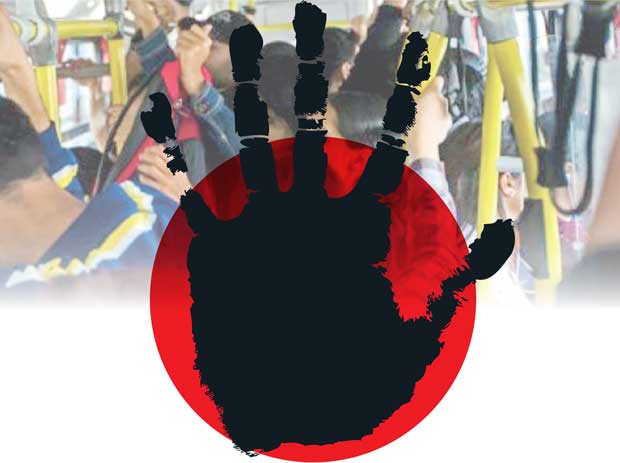 What is sexual harassment?
What is sexual harassment? 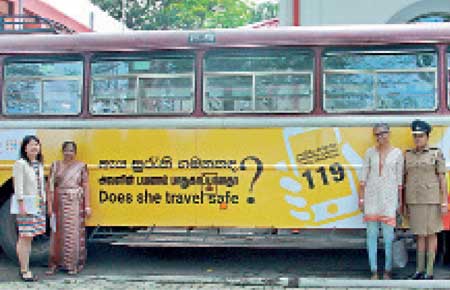
The International Women’s Day, celebrated today calls for a more inclusive, gender-equal  world. Women more often than not, are at a disadvantage simply for being born a woman. While there are issues pertaining to the wage gap and the glass ceiling preventing a woman excelling professionally, women irrespective of class, creed and race, are also subjected to sexual harassment almost daily wherever they go, which in turn crushes their confidence and reduces their productivity. Hence, this year’s theme-‘Be Bold for Change’- is timely, and all men and women should act promptly and with vehemence to put an end to all forms of gender-based violence which include sexual harassment anywhere.
world. Women more often than not, are at a disadvantage simply for being born a woman. While there are issues pertaining to the wage gap and the glass ceiling preventing a woman excelling professionally, women irrespective of class, creed and race, are also subjected to sexual harassment almost daily wherever they go, which in turn crushes their confidence and reduces their productivity. Hence, this year’s theme-‘Be Bold for Change’- is timely, and all men and women should act promptly and with vehemence to put an end to all forms of gender-based violence which include sexual harassment anywhere.
A recent study by the United Nations Population Fund (UNFPA) revealed that 90% of women between the ages of 15 and 35 have been subjected to sexual harassment at least once. This revelation is no surprise as public transport has always been known to be a place where men harass women and walk off scott free. The study further reveals that only 4% sought help from the police. While reasons for not taking action could vary, one of the main reasons is the lack of confidence on the police force and the justice mechanisms that action would be taken expeditiously. The forms of sexual harassment found on public transport include deliberate touching of a part of the body, excessive closeness, improper seating etiquette, rubbing genitalia against another body, trampling another person’s foot deliberately, fixed gaze on parts of the body, suggestive looks and asking for telephone numbers.
The UNFPA organised a press conference recently to brief the media on the findings of the study. The panel of speakers included representatives from the UNFPA, government authorities and civil societies and they expressed thoughts on this despicable ‘trend’. Speakers highlighted how perpetrators acted with impunity while victims never complained because of this very impunity. While emphasising on the need to prevent such incidents, the speakers also dealt with practical difficulties encountered in lodging complaints.
 “How is it that men have developed such impunity surrounding such offences?”
“How is it that men have developed such impunity surrounding such offences?”
Paba Deshapriya
- Grass-rooted Trust
“Sexual harassment on public transport should be looked at from the perspective of a symptom of a disease and not as a problem. Where ever women go they are at least verbally abused. They are treated as objects,” said activist Paba Deshapriya from the Grass-rooted Trust.
Remarking that women were sexually harassed not only in buses and trains, but also in market places, schools, workplaces she pointed out how a study conducted in 2014 showed that among South Asian countries Sri Lanka ranked first in the list of sexual harassment in media institutions.
“I understand that there are so many complaint mechanisms, redress mechanisms and I appreciate them. But at the same time we need to look at how we can address this issue comprehensively,” she said adding that sexual organs did not give men the power to feel superior to harass women or take advantage in treating women in a demeaning manner. How is it that men have developed such impunity surrounding such offences?” she quizzed.
“Since 1994 development partners have recommended relationship education in schools where children are taught respect to self, to differences and others. How is it that we have not been able to come to a long-term solution even with these longstanding recommendations? In our society there is no concept of self-respect and respecting others. We respect either a person older to us or with more power(like ministers). Women are not represented in both these groups,” she added.
 “It is a form of gender based violence.”
“It is a form of gender based violence.”
-Ritsu Nacken
- UNFPA Sri Lanka Representative
Ritsu Nacken, the representative of the United Nations Population Fund (UNFPA) elaborated on the findings of the study done in 2015 with participants from all 25 districts.“The findings revealed a shocking reality. 90% of women and girls between the ages of 15 and 35 have experienced sexual harassment at least once when travelling in buses or trains. What was even more alarming was that only 4% sought help from legal enforcement agencies. 50% of women said that they used public transport as means to travelling to work and of them 37% said that the harassment they experience affects their productivity at work,” she said
Stressing that sexual harassment was a socio-economic issue that must be addressed as a national priority she added that there were many contributory factors that need to be addressed as outlined in the national action plan. “There is the need for strengthening response systems, legal enforcement and the need for positive behavioral change. Positive behavioral change is a long term process that includes empowering the victim, to speak up, empowering the bystander to intervene and ensuring the perpetrator is held accountable,” she noted.
“Sexual harassment violates basic human rights. It affects women physically, psychologically and economically. It is a form of gender based violence which can occur anywhere even at home, the workplace or the street,” she added.
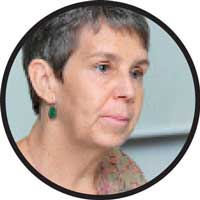 “If that wereyour mother, your daughter, your aunt, your grandmother, would it be the same?”
“If that wereyour mother, your daughter, your aunt, your grandmother, would it be the same?”
Una McCauley-
United Nations Resident Coordinator
Una McCauley, the Resident Coordinator of the United Nations posed a though-provoking question to the audience. “My question to all those perpetrating unnecessary touching, crowding, rubbing of genitals, trampling on people, fixing their gaze on people’s body parts, making suggestive and lascivious looks, if it was your mother, your daughter, your aunt, your grandmother would it be the same? It’s not how you would treat them. If that is how you treat them then it’s time to get help.”
“It is 2017 and we question as to why women don’t participate in the workforce, why women don’t like to go out, why women feel uncomfortable participating. Well, this is one reason why women don’t feel comfortable. And that’s not a 2017 you can be proud of,” she added.
 “Women who are subjected to harassment don’t take sufficient action.”
“Women who are subjected to harassment don’t take sufficient action.”
Swarna Sumanasekara
- Chairperson of the National Committee on Women
“Women who are subjected to harassment don’t take sufficient action. There are legal provisions to institute action against offenders. But hardly any woman makes a complaint and they are often silent. Very few go to the police to institute action,” said Swarna Sumanasekara, Chairperson of the National Committee on Women.
Noting that sexual harassment on public transport is a common occurrence she said such sexual harassment was one of the areas outlined in their action plan. “There are proposals to install a hotline to receive complaints by those who are harassed on public transport. The ministry is working on awareness programmes especially with regard to prevention, intervention and for advocacy,” she said.
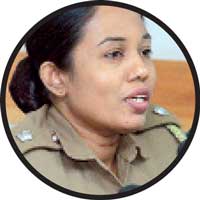 “Sexual harassment is a wrongdoing that can be filed as a criminal offence.”
“Sexual harassment is a wrongdoing that can be filed as a criminal offence.”
ASP L.R. Amarasena
- Head of Children and Women’s Bureau
of the Sri Lanka Police
Pointing out that prevention was paramount to resolve the issue in discussion, ASP L.R.Amarasena, Head of Children and Women’s Bureau of the Sri Lanka Police said that there was much hesitance among women to lodge complains on sexual harassment in public transport. Explaining as to why women did not complain she said, “No one who has used public transport to travel will be able to say that she has not experienced harassment. They try to bear the harassment and abuse, and proceed as they want to reach their destination as fast as possible. So in the interim if we are harassed, we don’t want to go to a police station.”
Stressing that sexual harassment was a wrongdoing that can be filed as a criminal offence she said that women she has spoken to expressed unawareness. For instance they didn’t know they can seek redress before the law, when subjected to sexual harassment.
“As the police we conduct special raids where we send a group of police officers to buses and trains. In this manner we have been able to catch a fair number of offenders. We have even gone to courts with the data obtained through these raids. This methodology will be used by the headquarters, the child and women office branches of the 42 police divisions to conduct raids this year as well. People are afraid of punishment. A possible offender might hesitate to harass women when he sees a police vehicle. The thought that the team of police officers who are looking into harassment are around might make them reluctant,” ASP Amarasena said.
Noting the practical difficulties that rise when trying to apprehend offenders and how available mechanisms can be used, ASP Amarasena said that the emergency hotline, 119 can be used to inform police and that they would take prompt action. “A bus is on the move. Suppose we start our journey from Pelawatte and the bus takes the route to Borella. Then if a victim is harassed she can call 119 and inform police where she is and where the bus is headed to. So the tip will be given to the Borella Police and the Thalangama Police, who will stop the bus on its way,” she said. “The 119 service enables us to act promptly as it’s an emergency service.Apart from that if the identity of the perpetrator is known complaints can be made to 1938 or 2444444(Children and Women’s Bureau ). Complaints can be lodged verbally or in written form,” she added. Emphasising on the importance of procuring evidence she said that the testimony of a witness is important before courts. “Even if men appear in court women hardly come. People can video or record using their mobile phones. Such video clips and photos are shared on social media. These can be used as evidence,” she said highlighting the social responsibility to prevent sexual harassment.
“Women and children have a right to inform the bus driver or conductor of the harassment they face at that time. Then they can take the perpetrators to the closest police station. If it’s a rural area they can be taken to an area where police officers are often present,” she added. However the study conducted by the UNFPA quotes a key informant saying that she had seen bus conductors unnecessarily touching small children.
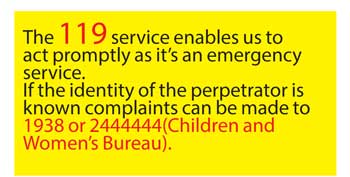

Add comment
Comments will be edited (grammar, spelling and slang) and authorized at the discretion of Daily Mirror online. The website also has the right not to publish selected comments.
Reply To:
Name - Reply Comment
US authorities are currently reviewing the manifest of every cargo aboard MV
On March 26, a couple arriving from Thailand was arrested with 88 live animal
According to villagers from Naula-Moragolla out of 105 families 80 can afford
Is the situation in Sri Lanka so grim that locals harbour hope that they coul